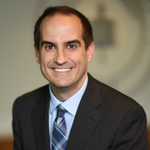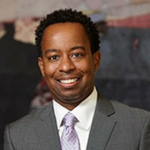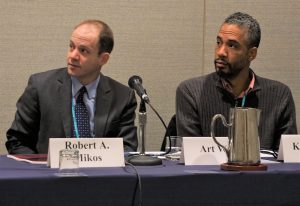Spotlight on Sections: State and Local Government Law
By Barbra Elenbaas
The AALS Section on State and Local Government Law promotes the communication of ideas, interests, and activities among members of the section and makes recommendations to the Association of American Law Schools (AALS) on matters concerning state and local government law.
We met with the leadership of the section in January 2017.

Chair: Matthew J. Parlow, Chapman University Dale E. Fowler School of Law

Chair-elect: Ngai Pindell, University of Nevada, Las Vegas, William S. Boyd School of Law

Immediate Past Chair: Sara Bronin, University of Connecticut School of Law
Our members are law professors who teach and write in the areas of state and local government law, some of whom have had careers in the public sector before teaching. In our section, we are lucky to have leading experts in taxation, public finance, the administrative state, and federalism, among other topics. Our section comes from a variety of political and geographic backgrounds. Some of our members work in the rural context, some in the urban context.
Matthew Parlow: We have some people who put state and local government law, both as a scholarly discipline and a practice area, on the map—people like Gerald Frug and Richard Briffault—who brought this area to prominence. It’s a neat thing, as a section, to have some of the scholarly founders of our area as active members of the group.
What can you tell me about your section’s program at the 2017 Annual Meeting?
SB: The program was intended to reflect the diversity of views on a topic that is very lively in the public eye right now, which is legalization of marijuana. The title was “Marijuana Law 2017: Federalism, Criminal Justice, and Health Care.” We had two law professors and a law professor moderator. We also took special care to invite non-academics who are actively working in this area: the Executive Director of the National Cannabis Bar Association and a senior director of the Drug Policy Alliance working in Colorado, which is very much a ground zero for these issues. The goal of the panel was to highlight the complex interplay of local, state, and federal laws and their impact on how users of marijuana interact with the health care system and the criminal justice system.
MP: We had multiple different angles of this issue being discussed at the same time. We had a good combination of academics and people working on the front lines in California and Colorado.
What are the important conversations happening right now in legal education regarding state and local government law?
MP: One thing that is on a lot of scholarly minds is the sanctuary city and what, if anything, the new administration may do with regard to them. More broadly: the city in the age of Trump. We don’t know what the administration is going to mean for a lot of cities—not just sanctuary cities—on a variety of levels. There is curiosity about how this will play out and how legal and policy issues will arise as conflict does or does not exist between cities and the new administration.
SB: Some of the most important conversations involve how local and state governments can continue to meet their own goals in light of a changing federal administration.
Ngai Pindell: There is also conversation about federal intervention and criminal law enforcement. That’s either a power of the purse issue—we will or will not give you more money for law enforcement in your city—or it potentially impacts federal intervention in areas that have not been areas of intervention in the past. But it’s hard to know when these, or any, changes in policy might come to pass.
Cities are especially interesting right now. One relationship is between the city and the state, and another relationship is between the city and the federal government. Those two relationships have always been fluid; they look like they’ll go through another examination and perhaps change during the new administration.
As there has been talk about giving rights back to the states, how has the conversation around state and local government law changed in response to the new administration (or how do you anticipate it will change)?
SB: I think we’ll have a lot of new cases dealing with these issues. We’ve had eight years of one administration; cities have gotten used to doing things a certain way. Now the new administration will clearly be reconfiguring some of preexisting programs and trying to take some autonomy away from local governments. I think we’ll see more litigation that will impact what we say in the classroom. It won’t affect the fundamentals and the framework—at least, we hope it won’t. That would be a pretty radical shift.
MP: One thing that may be highlighted by this, particularly if the federal government starts to push more legal and policy authority to the states, is the tension between certain cities and their respective state governments. We might also see, if states are empowered under the new administration, more of an attempt to erode home rule. States may not be the “laboratories of democracy” that Justice Brandeis once envisioned. Cities have almost supplanted states in flexing their policy muscles and trying things out. If there’s a conflict between a bigger city and its state government, I think we could see more preemption from the state government to thwart cities’ experimentation.
Much discussion across programs at the Annual Meeting centered around battles to be fought in the courts. How do you see that affecting state and local government law?
MP: It is hard to predict. It depends on where and how the conflicts happen. You could see some states like California trying to protect its cities. That state and most of its cities are probably on the same page with their policy preferences. Other states and their big cities might not be. Those cities may not get the same kind of protection from their states. Certain states might try to pass legislation to protect cities so the federal government must come after the state as well, whereas others might work in concert to try to thwart local experimentation. It’s hard to say how it will play out. I think it’s impossible to predict until they figure out where the conflict is and what each side is willing to do to try to resolve that conflict, if at all.
Have you or will you change the way you teach or study state and local government law based on these developments?
MP: It’s hard to say until we see whether these new cases pose some new and novel challenges or they are just preemption issues. I think it shows that state and local government law is an exciting area, especially as we’ve seen innovation on the local level in the last 20 to 25 years. I think that will continue. Political rhetoric has suggested that there are many cities and even states that are willing to try to make the case, in the political arena and in court, to protect what they see as their interests and powers to legislate for their constituents.
NP: I will likely focus on what is more static and what is more dynamic in these conversations. There are statutes that establish and set parameters for the local exercise of power. That’s the more static piece. We also live in local communities and we have state identities, and that’s constantly shifting and changing how we think in terms of the laws that govern that space. That’s the more dynamic topic. Certainly, a new presidential administration reorients peoples’ thinking about their own identity as well as the identities of their community and state. I’ll be interested in looking at how shifting politics and shifting identities affect how law is made or enforced and interpreted.
How do your section members interact and collaborate outside of the AALS Annual Meeting?
MP: There are a few ways: we have a section member, Joel Mintz, who has been doing a section newsletter for quite a while. Our section also started a State and Local Government Law Works-in-Progress conference that rotates to different law schools each year. Section members come together to workshop their latest scholarship. We recently had our fifth conference in Houston.
There are, of course, any number of informal ways that our members connect with each other.
SB: Joel uses the newsletter to highlight new scholarship from section members. There’s always a letter from the [section] chair, and he’ll usually put something in about the Annual Meeting program and the works-in-progress conference. It’s nice to have a record of what happens in a given year.
NP: For me, the work of the section also intersects with other AALS and academic units. For example, many of us who teach and write in state and local government law also teach and write in property law, which offers additional opportunities for conversation and collaboration.
How does your section support the scholarship of your members?
MP: Letting each other know, through the section’s newsletter for example, is one way. The works-in-progress conference is another avenue that has been a good opportunity to share scholarship and grow. The majority of attendees are members of the section. There have usually been around 20 people in attendance at the works-in-progress conference. We advertise it to our members and on law professor blogs. Someone writing a piece in local government law, even if it’s not their primary area, is welcome to come.
Many of the scholars who first brought your field to prominence are still active within your section. How has the study of state and local government changed since you’ve been teaching it?
MP: We have more textbooks than we did before, which is an indication of the expansion. Twenty or so years ago, people were mostly putting together their own materials. The field has evolved both in its understanding and its purview. There are so many ways one can look at state and local government law, as it touches so many areas of law; it shows the versatility of the field. There is so much one could cover. It comes down to what resonates with a specific professor.
How do you choose the lens in your teaching when you have so many available to you?
MP: I like to make the material relevant to what students are seeing around the country, and of course there are foundational things you want them to learn. I have approached it by thinking about what the frontline issues are for cities and states, and delving into those. Because it is such a robust area, you see different things popping up all the time. Legalization of marijuana is one example, and even that has myriad issues related to it: everything from federal state preemption, to land use issues, to different regulations that govern growing and distribution. There are many ways you can tackle even that one example issue.
NP: There are many different points of entry to state and local government law, and people can then explore the field through that experience. I came to the field from community and economic development law. I was interested in public and private partnerships, local funding opportunities, and local grassroots organizing, among other areas. A number of state administrative agencies work in that space, and one way to approach state and local government law is to study how they all interact. That’s one of the many lenses for state and local government law.
What is your vision for the section, this year and in the years to come? What new initiatives, project-based or ongoing, would you like to see as part of the section?
SB: This section will continue to convene scholars on the pressing issues we’ll be facing in the coming years about the authority of state and local governments in an era of changing federal administration. I think that’s going to be a very fruitful area for scholarship and expect that is what the section will be focusing on. We are fortunate that our section embraces collegiality and collaboration, because these discussions will raise some challenging questions.
MP: I think there will be a burgeoning number of issues that we will all want to gather and discuss, write about, and give each other feedback on. We look forward to facilitating those conversations on a national scale through AALS. We hope to continue bringing in practitioners from the field, as well. State and local government law is a very practical area in terms of where people’s lives intersect with law and policy. Those are important conversations to have as we try to produce impactful scholarship.
We want to be the forum to facilitate discussions during what may be a very interesting time for state and local government law. We don’t know exactly what the future is going to hold, but we expect it will have some robust legal and policy issues to discuss. We are looking forward to doing that as a section.

Section on State and Local Government Law panel at the 2017 AALS Annual Meeting



